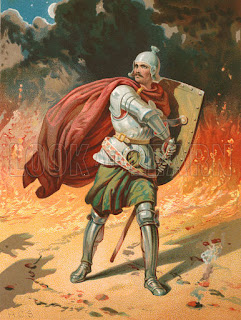Characters from Pilgrim's Progress -- Valiant for Truth
There are aspects of John Bunyan’s famous allegory Pilgrim’s Progress that have more
details as you read on through the second portion of it concerning Christian’s
wife and children who flee from the City of Destruction. As their story unfolds, we read about some
events that Christian went through but is not as detailed in the first half of
the story as he is relating a first person account. The story told by one of those characters in
the second half is who I want us to visit with now. The character is Valiant for Truth. What a powerful name that Bunyan picks out
for this young man, this young soldier, this young minister. Bunyan is playing off Jeremiah 9:3 where the
weeping prophet notes that there are some who aren’t valiant for the
truth. One of the chief characteristics
of John Bunyan is pointed out by Charles Spurgeon and it is observed very
clearly in this segment of the allegory.
Spurgeon noted that in reading all of Bunyan’s works and actually having
read Pilgrim’s Progress more than 100
times, he said that when you read Bunyan, “he bleeds bibline.” That means that his writings are so loaded
with Scripture that you cannot help but notice how familiar that Bunyan is with
the Word and he brings forth its application to us in a very helpful way.
Christiana and her children meet up with Valiant for Truth
at a very important piece of ground in the story. They are being led by Great Heart who has led
them to this point out of the City of Destruction. Just as Evangelist played a very important
pastoral role for Christian, Great Heart does the same for Christiana and her
children. Again, I would reiterate the
great need for active pastoral ministry in our times. Programs, causes, schools, and events can
never take the place of a godly pastor who is honoring his calling of prayer
and ministry of the Word in the local church.
As he leads them, they come to a place in the journey just beyond where
Turn Away, from the City of Apostasy, had attempted to dissuade Christian from
going on any further. At that point in
their journey, Great Heart spies a man standing in the road with a drawn sword
and blood all over his face. His clothes
are a bit disheveled as if he has extended a lot of energy. It is obvious that this man has just been
engaged in a battle that was quite violent.
This young man soon introduces himself as Valiant for Truth.
Valiant for Truth had grown up in the city of Darkland which
was along the coast not very far from the City of Destruction. The citizens were once visited by a preacher
whose name was Mr. Telltruth that came to Darkland on an evangelistic
endeavor. While he was preaching, he referred
to Christian who had forsaken the City of Destruction. He was a man who had left all, wife and children,
material possessions, job opportunities, and social relationships to go to the
Celestial City. There was nothing that
had been important enough for him to give up for entrance into the Celestial
City. Mr. Telltruth told of Christian
fighting with a serpent along the way and prevailing against it. This reference is the place in the allegory
where Christian fights with Apollyon in the Valley of Humiliation. Mr. Telltruth then goes on to recount the victorious
ending that Christian has not just in that battle but at the end of his journey. He notes the company of the Shining Ones that
come to receive him immediately after crossing the river. Mr. Telltruth then turns that testimony into
how the power of the gospel works and Valiant for Truth is converted as a young
man and he too starts his pilgrimage on to the Celestial City by leaving
Darkland.
After Valiant for Truth related his conversion to the travelers,
Great Heart introduces him to Christiana and her children. When Valiant for Truth realizes this is the
family of Christian he is overjoyed by their exit from the City of
Destruction. It is then that Bunyan
starts describing Valiant for Truth almost casually as he talks to him and
draws out through the conversation what he has experienced in his own personal
walk. I would like to note just three
very abbreviated points from that scene:
He has a Jerusalem blade.
This is a very special sword that has been crafted with great authority. Great Heart exclaims that it is important for
every man to have a blade like this one and a hand to exercise it and use
it. It has edges that are never dull and
it can cut flesh, bone, soul, and spirit (Heb. 4:12). It has the ability to cut through every
remarkable lie and deception the enemies of that of the faith can throw at a
traveler. Every believer and every
minister must make the Blade a priority in their life. D. A. Carson said, “There is no long-range
effective teaching of the Bible that is not accompanied by long hours of
ongoing study of the Bible.” Your Blade must
become your priority! Your Blade is
inerrant, authoritative, accurate, and sufficient. You can believe in it for it has the power to
allow you to know what God’s mind is.
He has been in several battles with this blade. Valiant for Truth had fought with this sword
until the blood of his enemies and even some of his own mingled together and
had run down the sword onto his hand.
The blood had dried in the heat of the battle and his hand had “clave”
to the sword so that it had to be pried out of his hand after the battle had
taken place (2 Sam. 23:10). Great Heart
makes an application here that needs to stand out to every saint, Valiant for
Truth had fought so hard in the battle that it had cost some of his own
blood. Great Heart commends him for his
resistance that had been so great it had come to the point of the shedding of
blood against his own sin (Heb. 12:4).
We can never forget that as saints of God, there still should be an
ongoing mortification of the flesh that Paul called us to in Romans 6. We live in day where there seems to be very
little mortification of the flesh. It is
clear that worldliness has a grip on the American church. Lower things to the lowest common
denominator, tell people what are the heaven/hell issues so they can live way
below the high calling, church attendance isn’t nearly as important now as in
the past, and a host of other matters have us on the ropes. Despite what might be touted as the modern
church being as powerful as the early church, that obviously is not taking
place in America. Social media has
ripped away a façade and has allowed many to see the lifestyles of Pentecostals
that isn’t much different from worldlings 10-15 years ago. I constantly remind myself that if some of
the old saints were removed from their graves and dropped into our lifestyles,
I have a feeling they would be appalled at the drift of things. Get in the battle with your Blade. Live up to your high calling, O man of God!
The immediate battle was worth describing. Great Heart soon gets to Valiant for Truth’s appearance
indicating he had been in a ferocious fight.
Valiant for Truth said the worst battle he had fought was with three
ruffians. They were Wildhead,
Inconsiderate, and Pragmatic and they came after him with a vengeance. These scoundrels nearly got the best of him before
he was able to prevail with the work and power of the Spirit of God. What is particularly insightful is where
these enemies had come from. The fight
with these fellows had not taken place in the Valley of Humiliation or along
some ambush at the edge of the path in the dark. Valiant for Truth said the biggest enemies he
faced were the ones that came from his own heart. When we hold the truth in high regard, when
we honor sound doctrine, when we place a priority on holy living that is
separated from the world, there is a high tendency to be wild-headed about your
beliefs, inconsiderate of sinners and slipping saints, filled with pride and conceit,
and arrogance (and some may feel this was demonstrated in the previous section). If truth was attacked, Valiant for Truth
could be counted on to battle with an intensity that unnerved ordinary
men. He would have died for the truth
without a second thought because he loved it so much and refused to sell it. Because he was inconsiderate of others, he
could never put himself in a place where he might walk a mile in their
shoes. He wasn’t able to extend any
patience at all for the backslidings, luke-warmness and apathy that sometimes
comes to even the best of saints and preachers as well. Valiant for Truth had to destroy those
enemies or they would have taken him down.
This scene is filled with a host of other matters that I
trust you will want to hunt down for yourself.
However, I cannot conclude without telling about Valiant’s crossing over
into the Celestial City. When he comes
to the end, he starts passing along the things that were his personal belongings. He passes on his sword, his courage, and his
skill to the man who can attain to the ability to use them. Then he pauses, “My Marks and Scars I carry
with me, to be a witness for me that I have fought His battles who will now be
my Rewarder!” In my opinion, this is
another one of the most powerful statements in the entire allegory. My encouragement for you is that you will be
valiant for the truth and that you will have some marks and some scars to
present to your Redeemer, your Rewarder.
Be valiant for the Truth!
Thanks for reading. . .
To be continued. . .





Comments
Amen! And thank you for pointing out zealots need to be merciful. May God continue to bless you and this blog!